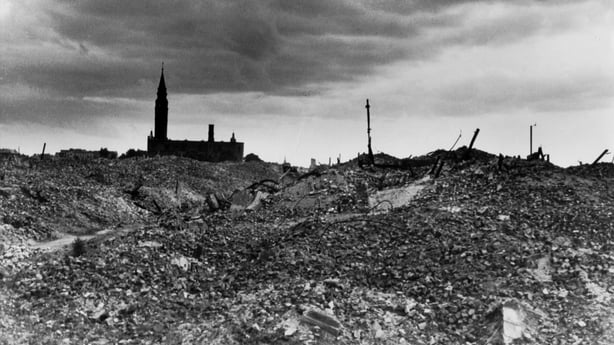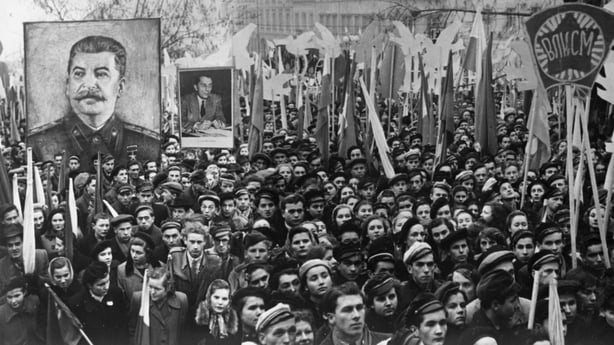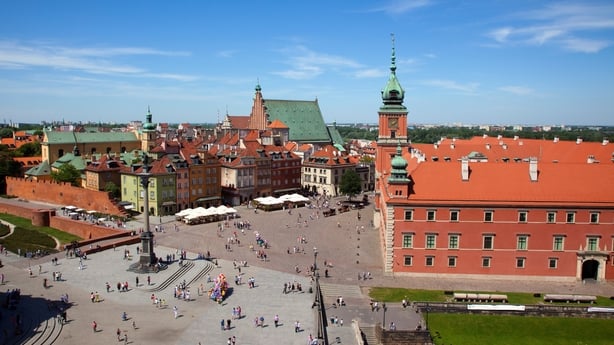At 87, Professor Christian Tomuschat, a German jurist, remains sharp.
He was born in what is now the northern Polish city of Szczecin. Prior to 1945, it was the German city of Stettin.
"My grandmother and my aunt, they perished when the Soviet invasion went into Germany. They both perished under dreadful circumstances," he told RTÉ News.
Though a witness to the destruction of World War II, Prof Tomuschat, a former UN rapporteur with a long career in human rights, is critical of Polish demands for Germany to pay €1.3 trillion in reparations for damage inflicted by Nazi Germany during the war.
"This was all settled long ago, many years ago," said Prof Tomaschat, adding that Poland's claim "has no basis whatsoever".
The Polish government disagrees.
Last September, Poland's Prime Minister Mateusz Morawiecki, and his Law and Justice party leader, Jarsolaw Kaczynski, unveiled a 663-page report on Polish losses, inflicted by Nazi Germany from 1939 to 1945.
A team of 33 researchers, commissioned by the ruling right-wing government, calculated the cost of the damage at €1.3 trillion in today’s terms. That is almost one-third of Germany's current annual GDP.
German Chancellor Olaf Scholz rejected the idea of paying reparations within days of the report’s publication.
"Like all federal governments before, I can point out that this question is conclusively regulated under international law," said Mr Scholz, in an interview with newspaper Frankfurter Allgemeine Zeitung.
In October 2022, Polish foreign minister Zbigniew Rau sent a diplomatic note to Germany’s Federal government, requesting payment of the sum. In reply, Germany's foreign minister Annalena Baerbock said the matter was closed.
At his office in Warsaw, Arkadiusz Mularczyk, secretary of state for Poland's ministry of foreign affairs, gave an outline of the report that could unsettle decades of relatively good Polish-German relations.
"We started this work in 2017, five years ago, and now we have a serious dialogue," Mr Mularczyk told RTÉ News.
Germany is Poland's largest trading partner. Trade between the two countries amounted to more than €140 billion last year, and almost one-third of Polish exports are sent to Germany.
Why is Poland demanding reparations now, almost 80 years after the end of that devastating war?
"We never had a real chance to present our history on the global scale," said Mr Mularczyk.
After the fall of Communism, successive Polish governments, he said, instead needed to focus on joining NATO and the European Union.
Mr Mularczyk, and the Law and Justice government that he represents, are intent on settling a financial score that, they say, was never resolved by Germany.
In an emailed response to questions from RTÉ News, a spokesperson for Germany’s foreign office said that the issue of reparations "is closed in the view of the Federal Government", echoing the words of Germany's foreign minister last October.
"Of course, the responsibility that Germany bears for the crimes committed during the Second World War is never closed. We stand by this unequivocally – in political and moral terms," read the statement.

Russia's destruction of Ukrainian cities has brought the concept of reparations back into public discourse for the first time in decades.
Last November, the UN General Assembly passed a resolution calling on Russia to pay reparations to Ukraine. Poland supports Ukraine's demand while, at the same time, is pursuing its own historical case.
Six million Poles, including three million Polish Jews, perished during World War II, equivalent to about one-fifth of the country’s pre-war population.
Warsaw, once the "Paris of the East", was systematically razed to the ground by German forces in late 1944 following the defeat of the Polish Home Army's nine-week long uprising. Many other Polish cities and towns were flattened.
Poland’s territory was then shifted 200km to the west, a decision taken by Roosevelt, Churchill and Stalin at the Yalta conference in February 1945.
This meant that about 45% of Poland’s pre-war territory became part of the Soviet Union. Today, this area is part of Belarus, Ukraine and Lithuania.
In return, post-war Poland, though smaller, received about one-fourth of the former Reich’s eastern territory, areas that were more industrialised than the land lost to the Soviets.
"Poland received large amounts of compensation," said Prof Tomuschat, through the transfer of this territory.
"But, of course, human lives can never be counted totally in monetary terms," he said.
After the end of the war, the Allies agreed that Eastern European countries, which had been occupied by Nazi Germany, would receive compensation in the form of raw materials from East Germany, then part of the Soviet zone of occupation.
In reality, the Soviets took the bulk of raw materials for themselves.
"The Polish government always said they didn't receive any reparations. That's simply not the case," Professor Stefan Lehnstaedt, a German historian who specialises in World War II, told RTÉ News.
"They received reparations. Yeah, they didn't get dollars or euros or marks, but they received goods, parts of factories, railway tracks from Eastern Germany," said Prof Lehnstaedt.
He said that the €1.3 trillion sum was a "very fair estimate" of damage inflicted by the Nazis in Poland.
Germany maintains that Poland waived its right to demand further reparations in 1953.
The Polish government disputes this point, arguing that post-war Poland was a Communist puppet state controlled by the Soviet Union.
Mr Mularczyk said that Poland’s Communist rulers did not publish the 1953 decision in the Official Gazette, a Polish legal journal where new laws must be published in order to be valid.
He also said that Germany lacked documentation to prove that Poland resigned from reparations.

Germany also maintains that the issue of reparations was settled conclusively in 1990, with the signing of the Two-plus-Four Treaty.
Signed by the former West and East German governments, and the four victorious allied powers, the US, the UK, France and the Soviet Union, the agreement recognised the sovereignty of the new German Federal Republic. It did not, however, mention any future reparation payments.
Poland was not a signatory to the agreement in 1990.
German governments since World War II have paid more than €80 billion in compensation to Holocaust survivors, and, in the early 2000s, Berlin established a €5.1 billion fund to compensate victims of forced labour under the Nazi regime.
Some of that money was paid to the surviving one million elderly Poles who had worked as forced labourers under the Nazis, but the sums were paltry, ranging from €3,000 to €7,600, according to the International Organization for Migration, which played a role in managing the payments.
The Polish government's reparations report says that the sums were much smaller – €150 per person on average.
Prof Lehnstaedt said that the case for making individual compensation payments to the last remaining victims was "morally so obvious", and more realistic than paying a lump sum on a national scale.
"You would probably easily get German politicians, and German society, convinced to make individual payments," he said.
In Germany, there is little or no public debate about Poland's claim for reparations. All German political parties back the government's position – that the case is closed.
Last September, the Sejm, Poland’s lower house of parliament, passed a near-unanimous resolution calling for Germany to "accept political, historical, legal and financial responsibility" for World War II – a rare example of unity in Poland's often bitterly divided political landscape.
Poland is heading into a parliamentary election in October, and opposing reparations would be an unpopular move for any political party, such is the weight that World War II, even today, holds over the country's collective memory.
One survey, conducted two months prior to the publication of the reparations report, found that 64% of Poles were in favour of Germany paying some form of reparations.

Relations between Warsaw and Berlin are cordial, but could be better.
Jaroslaw Kaczynski, the leader of Law and Justice and Poland's deputy prime minister, has a habit of directing prickly rhetoric towards Germany, often tinged with war references.
In late 2021, he said in an interview with a Polish conservative newspaper that a number of EU member states were "not enthusiastic about the prospect of building a Fourth German Reich" – a reference to Berlin's dominance in EU circles.
Yet, two decades ago, Germany was one of the main proponents of Poland's accession to the EU, which Prof Tomuschat said was "also a gesture of reconciliation".
"What Poland now does, is to destroy the reconciliation".
Mr Mularczyk said he recognised the importance of economic ties between Poland and Germany, but that, in order to build reconciliation, "we need to solve this historical problem".
Two days before Mr Mularczyk spoke to RTÉ News, he had attended a conference in Athens to discuss World War II reparations with a number of Greek lawyers, including former Greek President Prokopis Pavlopoulos.
In 2021, Greece renewed calls for talks to begin with Berlin on reparation payments for damage inflicted by Nazi Germany during its wartime occupation of Greece.
Law and Justice, and its minor coalition partner, Sovereign Poland, remain a few points ahead of the main centrist opposition bloc in the polls.
It is hard to imagine another Law and Justice administration relenting in its pursuit of reparations, and that may make it harder for Berlin to avoid the subject completely.







